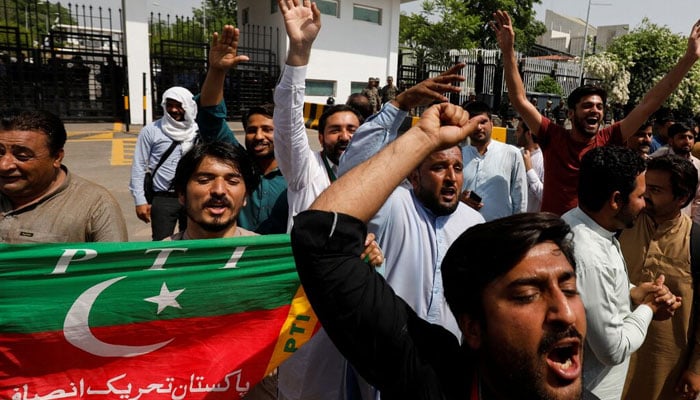March of missteps
PTI’s march, led by Imran Khan's wife Bushra Bibi underscores the party's penchant for creating chaos
The PTI’s so-called ‘final call’ for a march on Islamabad has unfolded as a disheartening saga of violence, political brinkmanship, and governmental incompetence. While the PTI may claim victory for reaching the capital despite the federal government’s confident assertions that it would not be allowed, the outcome is far from a win for any stakeholder. What could have been an exercise in democratic expression has once again devolved into a spectacle of anarchy, violence, and the misuse of state resources. The PTI’s march, led by Imran Khan's wife Bushra Bibi and backed by KP Chief Minister Ali Amin Gandapur, underscores the party's penchant for creating chaos. Mobilising provincial machinery and resources to facilitate the protest is a stark reminder of how the PTI blurs the lines between party and state. Meanwhile, the party’s failure to draw comparable support from provinces where it does not hold power exposes the limits of its nationwide appeal. The violence that accompanied the march, including attacks on media personnel and property further illustrate a rather aggressive and authoritarian tendency in the party that claims resistance, silencing dissenting voices with brute force rather than engaging in dialogue.
The federal government, for its part, has also failed to cover itself in glory. Its reliance on containers, roadblocks, and internet shutdowns has caused immense inconvenience to ordinary citizens, adding to the public’s frustration. By oscillating between overconfidence and panic, the government mismanaged the situation from the start. Declaring that the march would not enter Islamabad, only to be proven wrong, was a glaring misstep. The deployment of the military under Article 245, alongside unverified reports of shoot-on-sight orders, signals a dangerous escalation that could further erode public trust in state institutions. The government’s inability to anticipate the PTI’s tactics, despite years of watching its playbook unfold, is baffling. A smarter approach would have been to allow the march to proceed to a designated area, neutralising its spectacle and denying the PTI the opportunity to claim victimhood. Instead, by creating bottlenecks and taking repressive measures, the government inadvertently handed the party a narrative of resistance and persecution. The strategy of engaging the Islamabad High Court for legal measures or providing a designated protest space like Sangjani was suggested by many but ignored, to the government’s detriment.
The role of certain journalists and media outlets in propagating disinformation during this fraught time also deserves scrutiny. The erosion of credibility in journalism, driven by sensationalism and personal biases, has added fuel to an already volatile situation. Disinformation, whether aimed at discrediting either side, only serves to deepen polarisation and mistrust in society. At its core, this episode reveals a deep malaise in Pakistan’s political and governance systems. A protest that could have been an exercise in democratic dissent has turned into a dangerous game of brinkmanship, where the primary losers are the ordinary citizens caught in the crossfire. Both the PTI and the government must reflect on their conduct: one for weaponising chaos and violence, and the other for its ham-fisted response that has left it looking weak and unprepared. If Pakistan is to navigate its political crises effectively, all sides must abandon the politics of brinkmanship and focus on constructive dialogue and governance. Failure to do so will only deepen the fractures in an already divided polity.
-
 Bridgerton’s Michelle Mao On Facing Backlash As Season Four Antagonist
Bridgerton’s Michelle Mao On Facing Backlash As Season Four Antagonist -
 King Charles Gets New ‘secret Weapon’ After Andrew Messes Up
King Charles Gets New ‘secret Weapon’ After Andrew Messes Up -
 Shia LaBeouf Makes Bold Claim About Homosexuals In First Interview After Mardi Gras Arrest
Shia LaBeouf Makes Bold Claim About Homosexuals In First Interview After Mardi Gras Arrest -
 Princess Beatrice, Eugenie ‘strained’ As They Are ‘not Turning Back’ On Andrew
Princess Beatrice, Eugenie ‘strained’ As They Are ‘not Turning Back’ On Andrew -
 Benny Blanco Addresses ‘dirty Feet’ Backlash After Podcast Moment Sparks Online Frenzy
Benny Blanco Addresses ‘dirty Feet’ Backlash After Podcast Moment Sparks Online Frenzy -
 Sarah Ferguson Unusual Trait That Confused Royal Expert
Sarah Ferguson Unusual Trait That Confused Royal Expert -
 Prince William, Kate Middleton Left Sarah Ferguson Feeling 'worthless'
Prince William, Kate Middleton Left Sarah Ferguson Feeling 'worthless' -
 Ben Affleck Focused On 'real Prize,' Stability After Jennifer Garner Speaks About Co Parenting Mechanics
Ben Affleck Focused On 'real Prize,' Stability After Jennifer Garner Speaks About Co Parenting Mechanics -
 Luke Grimes Reveals Hilarious Reason His Baby Can't Stop Laughing At Him
Luke Grimes Reveals Hilarious Reason His Baby Can't Stop Laughing At Him -
 Why Kate Middleton, Prince William Opt For ‘show Stopping Style’
Why Kate Middleton, Prince William Opt For ‘show Stopping Style’ -
 Here's Why Leonardo DiCaprio Will Not Attend This Year's 'Actors Award' Despite Major Nomination
Here's Why Leonardo DiCaprio Will Not Attend This Year's 'Actors Award' Despite Major Nomination -
 Ethan Hawke Reflects On Hollywood Success As Fifth Oscar Nomination Arrives
Ethan Hawke Reflects On Hollywood Success As Fifth Oscar Nomination Arrives -
 Tom Cruise Feeling Down In The Dumps Post A Series Of Failed Romances: Report
Tom Cruise Feeling Down In The Dumps Post A Series Of Failed Romances: Report -
 'The Pitt' Producer Reveals Why He Was Nervous For The New Ep Of Season Two
'The Pitt' Producer Reveals Why He Was Nervous For The New Ep Of Season Two -
 Maggie Gyllenhaal Gets Honest About Being Jealous Of Jake Gyllenhaal
Maggie Gyllenhaal Gets Honest About Being Jealous Of Jake Gyllenhaal -
 'Bridgerton' Star Luke Thompson Gets Honest About Season Five
'Bridgerton' Star Luke Thompson Gets Honest About Season Five




